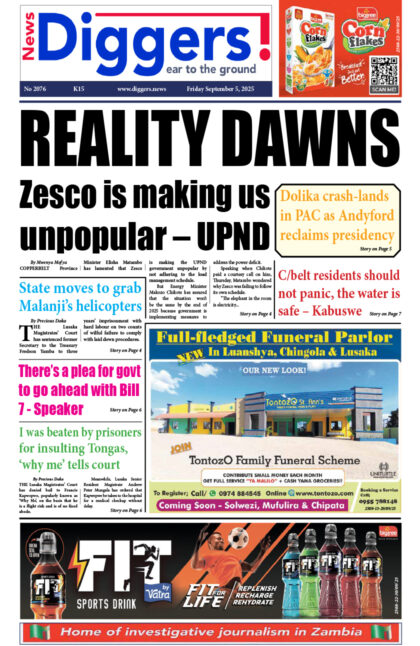When we first heard about the call for re-registration of vehicles in August this year, we were made to believe that the move was meant to facilitate for online payments of road tax. In our view, that was a welcome move because, indeed, the queues at the Road Transport and Safety Agency (RTSA) can be really annoying.
A person with a day job cannot succeed to take a 30-minute break and rush to RTSA for tax payment. If it’s a new car registration, someone has to be there literally the whole day. In many cases, when you find there are no queues at RTSA, it means two things; their system is down or there is no network. So, introducing an online payment mechanism that would eliminate all the hustle and bustle sounded like a progressive move.
But like is the case with many other policy decisions coming out of this government, the trickery was hidden in the detail. We were fooled into thinking that this car re-registration exercise was going to be at government expense. Now that it has been revealed that car owners will have to pay for the re-registration before paying for road tax, government has come up with all sorts of senseless justifications.
We could not believe the words that were coming out of Transport and Communications Minister, Brian Mushimba, as he tried to justify this extra toll on motorists. In fact, his explanation went far into detail, exposing the weaknesses and redundancy of some government institutions and their mandates.
“The reason for the exercise is this, as a country, we have a requirement for census for the people and for other strategic assets for national planning purposes. We are supposed to have a census on the vehicles every 10 years. But we have not done that since the 70s. So, as we speak today, we don’t know the number of vehicles we have in this country. So, government cannot plan properly; the roads that we need to have and the fly-over bridges they need to design because of the traffic volume that we have in the country. So, that’s number one,” said Honourable Mushimba.
“Secondly, we have struggled with criminalities being committed using vehicles and what we’ve discovered is that when someone commits a crime and the police get their number plate, when they go to RTSA to run it, that number is a clone number plate, it’s a duplicate and does not probably exist in the RTSA system. So, what RTSA is doing is to adopt technology in reading number plates biometrically, using the Radio Frequency Identification (RFID). What it means is that if your vehicle is stolen, within a very short period of time, it will be tracked.”
Let’s just go back to “as we speak today, we don’t know the number of vehicles we have in this country, and so government cannot plan properly for the roads.” We are not sure whether the Minister was trying to make us understand how incompetent RTSA is, that it doesn’t keep records of the cars it registers or he meant to reveal that the statistics that Mr Zindaba Soko gives to the public are fake.
It was exceedingly disappointing to hear the Minister declare government’s ignorance on the number of cars that citizens are bringing into the country, and it was even more annoying to hear government’s plans to make people pay in order for the system to get this information.
We feel disappointed because this should be the easiest data to capture, really. As far as we are concerned, three State institutions should have this data on the fingertips: RTSA, the Zambia Revenue Authority (ZRA) and the INTERPOL Department at Police Force headquarters. With the introduction of tollgates, the Road Development Agency (RDA) and the National Road Fund Agency (NRFA) can actually give supplementary data on car records because they capture all vehicles that pass through their facility.
If these government institutions are so incompetent that they cannot capture this simple data with the existing mechanisms, as the Minister is suggesting, how can the people of Zambia expect that their stolen motor vehicle will be captured and brought back? Let’s not forget that we are talking about a country where robberies occur right at the police stations, in full view of armed officers. How can such a police service track down a stolen car in Nchelenge? And if we may ask, what would the people do if they paid for this service, and government failed to find their stolen car?
Look, Honourable Minister, save your energy because we already get it; this vehicle re-registration exercise is just another money-making venture that the government has identified. It is not any different from the toll plazas, Internet calling tax, national health insurance scheme, borehole levy and withholding tax on people’s rented property, among many other syphoning tricks.
This is what happens when a government spends money that it doesn’t have; it resorts to extorting from its own citizens! This trend of syphoning money from people will not end because this government is very arrogant with borrowing. They can see clearly that citizens are bleeding from all these taxes, but they keep increasing the cash burden.
If the Minister insists that this is not another money-making trick by the government, then it leaves us with no option but to speculate that perhaps the system simply wants to install the so-called biometric chip so that they can track down the movements of targeted political foes; otherwise, the census excuse is total nonsense!
So, we are sorry Honourable, but you have failed us once again. In our view, you must sit down and tell us how far you have gone in phasing out small commuter minibuses as you promised, because the 2019 deadline you talked about is knocking.
























